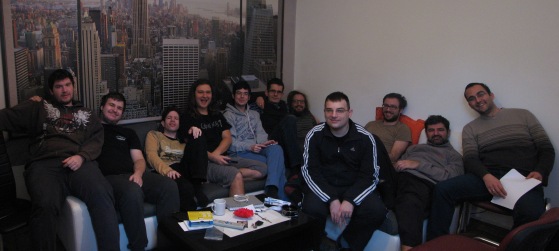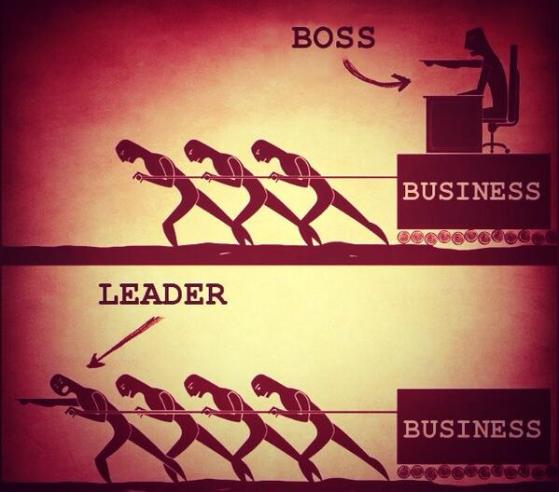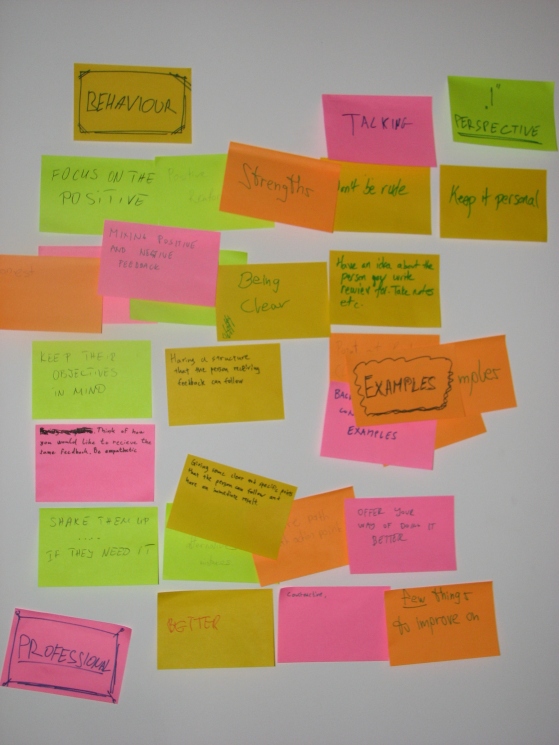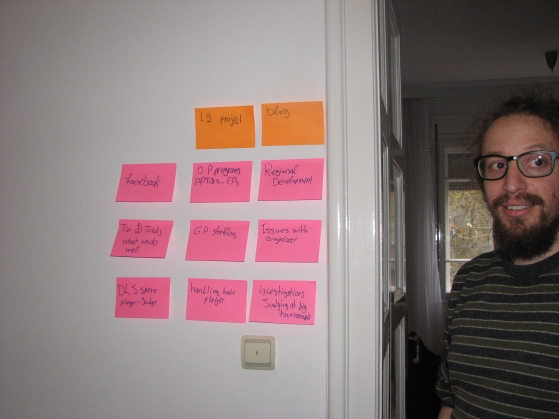On the weekend of November 27-29 there was a Regional Leadership Conference in Belgrade, Serbia. Participants included the Country Coordinators, as well as a couple other judges with leadership roles in their local area.

While the “official” part of the conference would not start until Saturday morning, Friday night was again a time for socializing – people were trickling in little by little (unlike the rain outside, which was pouring), enjoying a glass of beer or other drinks of choice, and reveling in the conversation.
Saturday morning started with a hearty breakfast, and then it was time to begin the presentations. We had relatively few of those, since most topics would be the subject of discussions rather than a single person sharing information with the rest of the participants.
Leadership and Motivation in Voluntary organizations
The first presentation was also the only one made by a person outside of the Judge Program – Sofia Beneva had volunteered to share her experience with leadership and motivation in volunteer organizations.
At the start, we discussed the differences between a leader and a manager:

- A leader stands out or arises, while a manager is appointed.
- A leader takes initiative and looks for improvements, while a manager makes sure that the team’s duties are getting done.
- A leader takes care and does things for others on the team, while a manager is looking for the organization first.
Ideally, of course, one person could combine the qualities of both a leader and a manager, making sure that the organizational goals are met, and at the same time ensuring that the team members are happy and satisfied. During the discussion, we mentioned that in the Judge Program, good leaders are being recognized, but more and more people also need the managerial skills so that the huge events can run more smoothly. Another interesting point (which was however left aside without much elaboration, mostly as a basis for future discussions) was that almost all judges start off as being interested in the rules of the game; their main motivation is being able to give good and correct rulings on the floor. Then, at some point, it turns out that the Judge Program also expect them to behave as leaders (and managers), to educate and motivate others and in general to have acquired many unrelated (to the rules) skills. However, it does not seem that the Judge Program has sufficient training methods in place to cultivate those skills (although there is progress being made).
Then there was a discussion about the components and factors that influence motivation. One of the current leading theories for motivation states that there are three main components that affect it:
- Autonomy – having the responsibilities and opportunities to work for something meaningful.
- Mastery – the process of growing as a person, of making progress in various skills that are important to a person.
- Purpose – finding the “greater meaning” of the work, having a sense of importance in the organization as a whole.
Notice the lack of factors like monetary compensation (salary), security or work conditions on the motivation. This is explained by research which shows that people are not really motivated by those factors – they are called “hygienic”. Instead, they can cause demotivation if they are not sufficient, so that people would complain often and have a certain lack of desire to actually work in that place.
Thus we arrived at the next main point in the presentation: since the Judge Program is a volunteer organization, in order to get motivation people should look more inside, rather than outside of themselves. One needs to realize what makes him/her happy and then try to do more of it. The opposite also holds true – whatever makes you unhappy, you should look for ways to do less of it.
The above ties nicely with the fact that the judge organization is not set in stone – you can make some changes to it. And while a broad and all-encompassing change would be really hard to achieve overnight, there are plenty of projects and initiatives that aim exactly at modifying the program to make it better in some detail.
Nearing the end of the presentation, we also discussed what one should focus on in order to improve the experience of everyone involved. We agreed that it is very important to include and express empathy in the communication both with players and other judges. It is a crucial element in creating a pleasant atmosphere and in good customer service; and while there would always be some cases where it interferes with the priorities of the tournament or of any other pressing tasks a judge has, one should generally not simply brush aside any complaint or request, no matter how bizarre it may seem at first sight. “You want a tournament at 6am? Go away, not happening.” is significantly worse than “You want a tournament at 6am? By all means, if you have at least 7 other players, we could try and arrange something (despite any discomfort this could cause).”
Giving Feedback
Ivan Petkovic had a workshop on giving feedback. It started by having everyone write a few characteristics of good feedback.
 Several groups of similar ideas were clearly visible:
Several groups of similar ideas were clearly visible:
- perspective
- examples
- behavior, not qualities
- keep it professional
… and then it was time for a game: everyone had to participate in a cooperative group activity, and then people were asked to give specific feedback to others about what happened before and during the game (here you can see us try and ultimately succeed at it). We saw feedback about behaviors in the brainstorming session before we started, during the game itself, and even some on the feedback people gave!
Here are some of the best pieces of advice that came up during the discussion:
- Do not use the “sandwich” technique for feedback: it is very outdated, and if people know that is what you are doing, it causes them to accept the entire thing negatively.
- You need to watch the questions you ask during the feedback process. Some questions cause defensiveness in the person receiving feedback and may result in negativity. This is especially true for questions asking “Why” someone did a certain thing.
- If you have a hard time finding/noticing things to give feedback about and write reviews (you are not alone!), one thing you can try to do is give feedback about every ruling you observe. Make notes about anything that did not feel fully correct and natural. Those are the things one can give constructive feedback about. If everything about a ruling left you in awe, this is also a great thing to write in a review!
- When giving constructive feedback, we generally want to point out and change a certain behavior. Since that behavior is a function of the personality and the environment of the person at the time. Since personality is really hard to change (impossible if the person doesn’t want to), thus we need to change the environment somehow – perhaps the person did not sleep well the night before?
- It is a useful exercise to try and eliminate the word “but” from your feedback; use “and” instead. This can be challenging and may even lead the changes in the way you think of certain problems.
As a final note for this part, we left with a question: is it possible/practical/doable in any way to receive feedback on judge reviews we write? If you have ideas that may lead to progress on this, do not hesitate to chime in the comments!
For the rest of the conference, we had topics that were meant for short reports and/or discussion rather than presentations. We implemented a system where we would start a discussion and a countdown timer (initially 10 minutes, later changed to 15) at the same time, then when the timer ran out we would vote whether to continue with the current topic or to move on. My personal observation was that with 11 people in the conversation, we probably needed a longer initial period for discussion since we never stopped the conversation at the first opportunity.

The L2 mentoring project – by Jernej + Giannis
+ Giannis
We were appraised of the changes in the project – while before people had to work on a schedule, with deadlines and regular meetings with the mentors, the new version of the project has all the data in a single file and relies much more heavily on the candidates’ desire to move on. In this way, now the burden of progress is on the candidates themselves. This is meant to improve on the flaw that candidates tend to “disappear” (take a long time to answer) and/or lose interest in the middle of the process.
Ivan Petkovic briefly presented the way this same project has developed in Germany: they now use “2HG format”, meaning two mentors and two mentees work together, they have weekly Skype meetings of about an hour each, with strict curriculum and homework for the mentees. This brings the benefit that even if one person is unable to attend, the meeting can still happen and progress will be made.
We spent some time discussing options and ideas to make the project more dynamic and interesting. Finding ways to gamify the problem (i.e. make it more like a game) in order to engage and motivate people to achieve the goal were discussed, as well as options like making the project global, or using a learning progress platform online.
Facebook page
While discussing the Facebook presence of the region judges group, we reached the conclusion that we are trying to keep too many things on it. The easy availability of the information means that the page is losing focus and it would be better if we can move some of the content to either the regional forum in apps.magicjudges.org or the newly-created blog. We discussed what can be done to revive the forum as a whole, as well as specific points on what should go in which platform.
Regional Blog
We had to make plans for the development, structure and content of the blog. We decided to have a “sticky” top post which would contain contacts, FAQ and other relevant links (+ an ad for contributions). After that, new posts would go under that sticky top post. The discussion yielded a conclusion that to keep the blog interesting, fresh and to maintain interest in visiting it, we should have new content at least once a week. Ideas about content categories included:
- countries
- reports
- projects
- interviews
- anniversaries
If you have ideas about blog posts or you want to contribute to the blog, please contact David de la Iglesia.
Regional Development
In this topic, we started by having Giorgos Trichopoulos, our RC, present some numbers about the region (unfortunately, they were current as of 01.03.2015, so not too fresh): numbers of judges (89 L1, 27 L2, 3 L3), advanced stores (70 total) and PPTQs that were held. Then each country coordinator presented the situation in their country in a few minutes. You will be able to read more about those presentations in the blog in the coming weeks.
Additionally, we discussed the levels of judge compensation in each country, as well as problems related to judges playing in events, whether they are judging those events or not.
PPTQs and GPTs
We discussed the state of important (smaller) competitive tournaments like the PPTQs and GPTs. We learned that there are “challenges on a worldwide scale” with them. Some pretty inexperienced TOs scheduled and ran bad PPTQs after they were introduced. Perhaps more relevant to our region, the introduction of PPTQs has almost “killed” GPTs and somewhat unexpectedly, other bigger tournaments as well. This is attributed to the ease of achieving the required status to run a PPTQ. As a consequence, training of judges suffered, and it was moved to GPs. This is not ideal, as very few L1s make it to a GP for training at all.
Ideas what could be done to change this situation included making the organization of PPTQs more exclusive – perhaps distribute a much smaller number of them to selected TOs, rather than allowing any Advanced store to schedule one. Or perhaps Wizards could introduce promos for PPTQs, which would make them more interesting. Giorgos promised to discuss options at the RC meeting in Barcelona during the WMC.
GP Staffing
Since we get fewer GPs with fewer judges per GP, Giorgos presented us with an overview of the GP application process. This is aimed at making applications better and our acceptance rate higher. Here is the application process in detail:
GP application window opens → Judges send in their applications (with a cover letter!) → the Judge Manager of the event reads them → they then send an email to RCs (who can also see the cover letters) → in our case, Giorgos will discuss with other L3s in the region, compare applicants with the spreadsheet of who has been to GPs recently, then → RCs give a score of 1 (best) to 4 (do not take unless there is an emergency) to each applicant, together with a comment about why certain people should or should not be accepted. Using this information, the Judge Manager then makes the final decision.
Given the above, judges should be mindful of their cover letters – often, this is the one piece of the application that can set you apart!
Judge interactions/problems with TOs
There was a discussion about problems judges can have with TOs, especially if they are playing in tournaments and not really there to judge. While it is easier for a TO to count on a judge being there to resolve issues without any sort of “downside” (decrease in profit), judges should at least try to talk to a TO before the tournament about what could or could not be expected of them, and if they want anything in return. History has shown that a judge present at a prerelease will significantly improve the experience of all players, and still many TOs do not see past the need to compensate this judge and refuse to hire one.
Additionally, it was also discussed that there are no actual tools to report problematic TOs. People who create fake tournaments, register non-existing players or even a “store” that is not there should be reported, but it seems that even when they are, there are no consequences for that. Additionally, judges can’t control it if a store puts them down as a judge for an event that they are not there for. This is punishable by the Magic Judge Code of Conduct, and yet we have no control over it, nor do we have a way to know that it has happened or to protest if we ever find out.
That was all for this year’s Leadership Conference in our region. I hope you enjoyed reading about the discussions and decisions we made. There were a few topics left untouched, and many more are still to be discussed, but this is what we had time for on that weekend.
